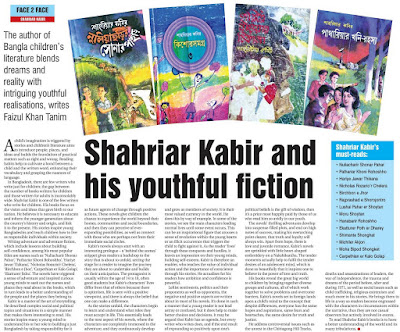Shahriar Kabir and his youthful fiction - Bangla children's literature at it's best

Shahriar Kabir and his youthful fiction
The author of Bangla children’s literature blends dreams and reality with intriguing youthful realisations, writes Faizul Khan Tanim
A child’s imagination is triggered by stories and children’s literature aims to introduce people, places, and ideas and builds the foundation of practical matters such as right and wrong.
Reading habits help to cultivate a bond between a child and the written word, enhancing their vocabulary and grasping the nuances of language.
In Bangladesh, there are few writers who write just for children; the gap between the number of books written for children and those written for adults is inconsolably wide.
Shahriar Kabir is one of the few writers who write for children. His books focus on the vision and ideas that gave birth to our nation. He believes it is necessary to educate and inform the younger generation about the country’s history and origin, and link it to the present. His stories inspire young Bangladeshis and teach children how to live as responsible individuals within society.
Writing adventure and adventure fiction, which include lessons about building self-confidence, among his most popular titles are names such as ‘Nuliacharir Shonar Pahar’, ‘Pathariar Khoni Rohoshho’, ‘Hariye Jawar Thikana’, ‘Nicholas Rozario’r Chelera’, ‘Birchbon e Jhor’, ‘Carpethian er Kalo Golap’, ‘Ekatturer Jishu’. The novels have triggered a sense of adventure and inspired curious young minds to seek out the names and places they read about in the books, which in turn leads to a better understanding of the people and the places they belong to.
Kabir is a master of the art of storytelling. He described complex social and political topics and situations in a simple manner that makes them interesting to read. His stories inspire many a young mind to understand his or her role in building a just Bangladesh by taking responsibility for it as future agents of change through positive actions.
These novels give children the chance to experience the world beyond their homes, communities and social boundaries, and then they can perceive of ever-expanding possibilities, as well as connect with those who are perhaps not from their immediate social circles.
Kabir’s novels always start with an interesting prologue – a ‘behind the scenes’ snippet gives readers a backdrop to the story that is about to unfold, setting the stage for a reader to imagine the journey they are about to undertake and builds on their anticipation.
The protagonist is usually within the age of 14 to 18, often good students but Kabir’s characters’ lives differ from that of others because there is optimism, life is seen with a positive viewpoint, and there is always the belief that one can make a difference.
As the stories unfold, the characters begin to learn and understand what roles they must accept in life. This essentially leads to the next aspect of his novels, where the characters are completely immersed in the adventure, and they continuously develop and grow as members of society.
It is their most valued currency in the world. He does this by way of example. In some of the stories, we see the main characters leading normal lives until some event occurs. This can be an inspirational figure that arouses a sense of revolution within the young hearts or an illicit occurrence that triggers the child to fight against it. As the reader ‘lives’ through these conquests and hurdles, it leaves an impression on their young minds, building self-esteem. Kabir is therefore an enabler, who teaches the value of individual action and the importance of conscience through his stories. He actualises for his readers how ambition and confidence is powerful.
Leftist sentiments, politics and their proponents as well as opponents, the negative and positive aspects are written about in most of his novels. It’s done in such a manner that a young reader is not lead astray or confused, but it does help to make better choices and decisions.
It may be argued that Kabir has an agenda, but every writer who writes does, and if the end result of expounding so positively upon one’s political beliefs is the gift of wisdom, then it’s a price most happily paid by those of us who read him so avidly in our youth.
The novels’ thrilling adventures develop into suspense-filled plots, and end on high notes of success, making his overarching point clearer, that truth and loyalty will always win. Apart from hope, there is love and juvenile romance. Kabir’s novels are sprinkled with little heart-shaped embroidery on a Nakshikantha.
The tender moments actually help to fulfil the tender desires of an adolescent mind, which is done so beautifully that it inspires one to believe in the power of love and truth.
His books reveal the great big world to children by bringing together diverse groups and cultures, all of which work together to solve problems and overcome barriers. Kabir’s novels set in foreign lands open a child’s mind to the concept that despite differences, everyone has the same hopes and aspirations, same fears and heartaches, the same desire for truth and justice.
He address controversial issues such as the unrest in the Chittagong Hill Tracks, deaths and assassinations of leaders, the war of Independence, the trauma and dreams of the period before, after and during 1971, as well as social issues such as child trafficking, religious extremism and much more in his stories.
He brings them to life in a way so readers become engrossed with the characters in circumstances within the narrative, thus they are not casual observers but actively involved in events.
To read Shahriar Kabir’s books is to have a better understanding of the world and its many tribulations.


Comments
hermes
off white outlet
air jordan travis scott
kyrie 5 spongebob
kevin durant shoes
bapesta
supreme clothing
supreme outlet
jordan sneakers